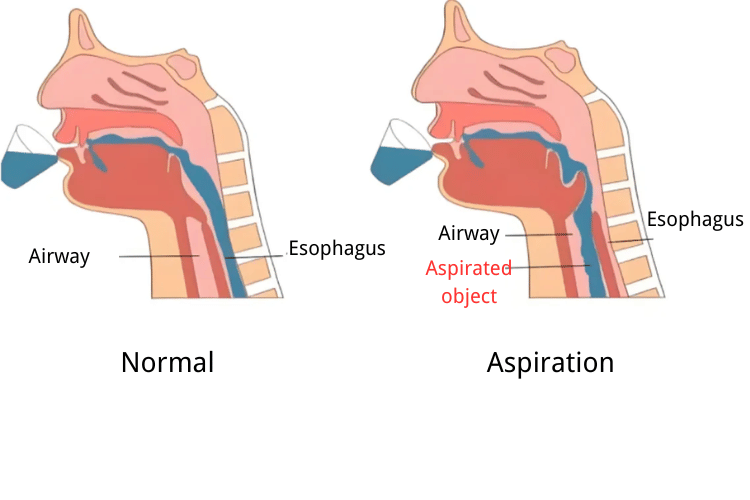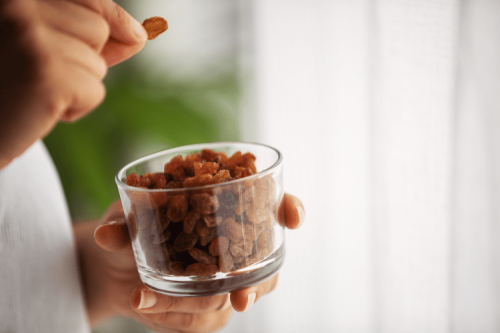
Choking on water might seem like a minor inconvenience, but it can be a recurring and concerning issue for many. While occasional choking may stem from distractions or improper swallowing techniques, persistent episodes could point to underlying health problems. Understanding the causes, prevention methods, and potential medical conditions linked to choking is crucial for improving your safety and quality of life.
This guide explores why people choke on water, common contributing factors, practical prevention strategies, and solutions. We'll also discuss the role of medical conditions like dysphagia, GERD, and neurological disorders in swallowing difficulties and provide actionable advice.
The Anatomy of Swallowing
Swallowing involves a precise and complex coordination of muscles, nerves, and reflexes to ensure food or liquid passes safely into the stomach rather than the airway. Any disruption can lead to choking.
The Three Phases of Swallowing
-
Oral Phase This is the beginning stage, where the tongue pushes liquid or food to the back of the mouth in preparation for swallowing.
-
Pharyngeal Phase The liquid enters the throat (pharynx). Here, the epiglottis (a small flap) temporarily closes the windpipe to prevent inhalation of liquids or food.
-
Esophageal Phase Liquid travels down the esophagus using rhythmic muscle contractions. Proper functioning here ensures a seamless flow into the stomach.
If one phase fails due to poor muscle coordination, neurological issues, or structural abnormalities, water may enter the trachea (windpipe) instead of the esophagus, causing choking.
Why Does Choking Happen?
At its core, choking occurs when the airway pathway remains open while liquid is introduced. Drinking too quickly, speaking while sipping, or weakened throat muscles can disrupt the swallowing reflex. This prompts the body’s natural defense mechanism, an intense coughing reflex, to expel the liquid.
Common Causes of Choking on Water
For some, choking on water may be a one-off event, but chronic instances often have clear triggers or medical explanations.
1. Drinking Too Quickly
Rushing to finish a drink can overwhelm the swallowing reflex, especially if large gulps are taken at once.
2. Talking or Laughing While Drinking
Multitasking while drinking disrupts the coordination of muscles that guide water through the esophagus.
3. Dry Mouth or Dehydration
Those with insufficient saliva production may find it harder to lubricate and swallow liquids smoothly, increasing the risk of choking.
4. Gastroesophageal Reflux Disease (GERD)
Chronic acid reflux can inflame and damage the esophagus, leading to swelling or the development of strictures (narrowing of the esophagus), which may disrupt proper swallowing.
5. Neurological Disorders
Conditions like Parkinson's disease, multiple sclerosis (MS), and stroke can impair muscle coordination needed for swallowing. These disorders can also reduce the sensation or awareness of liquids entering the throat.
6. Dysphagia (Difficulty Swallowing)
Dysphagia is a swallowing disorder that can stem from neurological, structural, or muscular problems. This condition makes it harder for people to control the movement of liquids, increasing the risk of choking.
7. Aging
Elderly individuals often experience weakened muscle control or delayed reflexes, leading to more frequent choking episodes.
8. Anxiety or Psychological Stress
Tension in the throat from anxiety can make swallowing harder, especially for those who develop a fear of choking.
9. Structural Issues
Narrowing of the esophagus (esophageal strictures) from scarring, tumors, or foreign bodies can obstruct the liquid’s smooth passage.

Normal drinking and aspiration
Conditions That Complicate Swallowing
While choking on water is often a benign issue, some health conditions make it recurring and potentially dangerous.
Dysphagia Explained
Dysphagia can result from various factors, including:
- Neurological Causes Stroke, ALS, or brain injuries that affect the signals between the brain and the swallowing muscles.
- Structural Causes Growths, scarring, or physical obstructions in the esophagus.
- Muscle Abnormalities Autoimmune diseases like scleroderma can stiffen the contractions of the esophagus.
GERD and Its Impact
Chronic acid reflux causes irritation that makes swallowing painful and can lead to complications like aspiration pneumonia (when liquid or food enters the lungs).
Neurological Disorders
Diseases like Parkinson’s and MS affect motor control, including the muscles involved in swallowing. A damaged swallowing reflex makes aspiration (liquid entering the airway) more likely.
Anxiety-Induced Choking
Stress-induced higher muscle tension in the neck and throat can mimic or exacerbate swallowing difficulties.
Preventing Choking on Water
Choking incidents can be significantly reduced by combining mindful practices and medical intervention (for severe cases).
1. Improve Swallowing Techniques
- Sit upright to align your throat and esophagus.
- Take small sips and pause between each swallow to avoid overwhelming your throat muscles.
- Try tucking your chin down slightly while swallowing; this can guide water away from the airway.
2. Eliminate Distractions
Avoid talking, laughing, or walking around when drinking. Focus entirely on the process of swallowing.
3. Stay Hydrated Gradually
Drinking water consistently throughout the day rather than gulping large amounts helps keep your throat lubricated and supports more natural swallowing.
4. Use Thickened Liquids
For individuals with severe dysphagia, thickened liquids (available in pharmacies) can make swallowing easier by slowing the liquid’s flow, reducing the risk of aspiration.
5. Practice Relaxation and Breathing Exercises
For those with anxiety-induced choking, calming techniques (e.g., deep breathing or mindfulness) can alleviate throat tension.
6. Work with Professionals
Speech-language pathologists can teach exercises to strengthen throat muscles or strategies for eating and drinking safely.
7. Address Underlying Medical Conditions
Treat conditions like GERD with medications to reduce acid reflux. Surgery may be needed to resolve strictures or other structural issues in the esophagus.
Responding to Choking Episodes
Knowing how to act promptly during a choking incident could save you or someone else from severe complications.
Recognizing Choking Signs
- Persistent coughing or gagging
- Difficulty taking a breath
- Gasping or wheezing sounds
- Bluish tint to lips or skin (cyanosis)
What to Do
-
Encourage Coughing The body's natural reflex is the most effective method for expelling water.
-
Provide Assistance If the coughing is ineffective and breathing remains difficult:
- Perform back blows (five firm blows between the person’s shoulder blades).
- Administer the Heimlich maneuver (abdominal thrusts) to dislodge the obstruction.
-
Seek Medical Attention Contact emergency medical services if choking persists, the individual loses consciousness, or aspiration is suspected.
Preventing Aspiration Pneumonia
Early intervention after choking minimizes the chance of bacteria-laden liquid entering the lungs, a common cause of aspiration pneumonia.
Frequently Asked Questions
Q: Why do I keep choking on water?
A: Frequent choking on water may indicate a swallowing difficulty known as dysphagia. This condition can cause food or liquid to enter the airway instead of the esophagus, leading to choking incidents.
Q: What are the common causes of dysphagia?
A: Dysphagia can be caused by several medical conditions, including neurological disorders like Parkinson’s disease and multiple sclerosis, as well as structural issues in the throat and esophagus. Acid reflux and other swallowing disorders can also contribute to difficulties in swallowing.
Q: How can I prevent choking on water?
A: To prevent choking on water, it is advisable to take small sips, ensure a calm environment during drinking, and use swallowing techniques recommended by a healthcare professional. If swallowing difficulties persist, consult a doctor for appropriate treatment for dysphagia.
Q: What should I do if someone is choking on water?
A: If someone is choking on water, encourage them to cough to clear the obstruction. If they cannot cough or breathe, perform the Heimlich maneuver to dislodge the blockage from their airway. If the situation does not improve, seek emergency medical assistance.
Q: What are the signs of choking?
A: Signs of choking include difficulty breathing, coughing, inability to speak, a blue or pale complexion, and clutching the throat. If symptoms are severe, acting quickly to prevent aspiration pneumonia or other serious complications is essential.
Q: Can swallowing difficulties lead to aspiration pneumonia?
A: Yes, aspiration pneumonia can occur when liquid, such as water, enters the lungs instead of the stomach due to choking or swallowing difficulties. This can lead to serious respiratory issues that require medical evaluation and treatment.
Q: What is the Heimlich maneuver, and when should it be used?
A: The Heimlich maneuver is a first aid procedure used to expel an obstruction from the airway of a choking patient. It involves applying abdominal thrusts to create pressure that can dislodge the blockage. This technique should be used immediately if a person is unable to breathe or speak due to choking.
Q: How can I recognize if I have a swallowing problem?
A: Recognizing a swallowing problem involves noting symptoms such as coughing during or after eating or drinking, a sensation of food being stuck in the throat, or frequent choking incidents. If you experience these signs, it is important to consult a healthcare professional for evaluation.
Q: What treatments are available for dysphagia?
A: Treatment for dysphagia may include swallowing therapy, dietary modifications, and, in some cases, medications to manage underlying conditions like acid reflux. A speech-language pathologist can provide tailored swallowing techniques to improve the swallowing reflex.
Final Thoughts
Choking on water is typically harmless when it happens occasionally. However, recurring episodes signal the need for a closer look at potential medical conditions or swallowing habits. Addressing underlying causes through prevention strategies, lifestyle adjustments, and medical care can improve safety and comfort significantly. If the issue persists, consulting a specialist is crucial to rule out severe health conditions.
Stay hydrated, vigilant, and mindful to drink with ease and confidence!








 Login with Google
Login with Google Login with Facebook
Login with Facebook